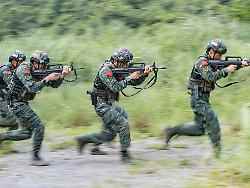Military exercise ended
New doctrine: China would send troops to Taiwan
08/10/2022, 3:55 p.m
So far, China has officially taken the line not to send soldiers and officials to Taiwan in the event of reunification. Beijing is now cashing in on this assurance. In addition, the leadership does not categorically rule out the use of force to achieve its goals.
China is tightening its course in the conflict with Taiwan. The leadership in Beijing reneged on its promise not to send troops or officials to Taiwan in the event of reunification. This emerges from a document and points to a decision by President Xi Jinping to grant less autonomy than previously offered to Taiwan, which the People’s Republic regards as a breakaway province. Meanwhile, the military declared its military exercises around Taiwan to be over after about a week. They have “successfully completed various tasks” and “effectively tested” the combat capability of the army.
China’s new white paper on its position on self-governing Taiwan follows unprecedented military drills near the island claimed by the People’s Republic as its territory. The trigger was the protest against the visit of the speaker of the US House of Representatives, Nancy Pelosi, to Taiwan last week. China had said in two previous white papers on Taiwan in 1993 and 2000 that it would not send troops or administrative personnel to Taiwan after what Beijing leaders called reunification.
China will always make great efforts to achieve peaceful reunification with Taiwan, the new Taiwan White Paper said. “But we will not refrain from using force and we reserve the right to take any necessary action,” it said. The use of force is “under compelling circumstances” the “last resort”. According to the Chinese leadership, foreign interference in Taiwan will not be tolerated. “We will thwart any attempt to divide our country,” it said. “The historic goal of reunifying our homeland must and will be realized.”
“Regular Patrols”
The West also recognizes Beijing’s one-China policy, according to which there is only one sovereign Chinese state. However, the governments maintain relations with democratic Taiwan at a lower diplomatic level, which is only recognized by a few states. The ruling Chinese Communist Party had proposed that Taiwan could be returned to its rule on a “one country, two systems” model – similar to the formula used to return the former British colony of Hong Kong to Chinese rule in 1997.
Western governments, however, accuse China of having already broken these promises in the case of Hong Kong. All established political parties in Taiwan therefore reject the proposal.
It was unclear whether China would continue its military maneuvers after the announced end. According to the Taiwanese Ministry of Defense, a total of 17 Chinese fighter jets flew over the so-called median line in the Taiwan Strait while military exercises continued near the island. Taiwan sees this median line as the border between the two countries. During the maneuvers, China also fired ballistic missiles at Taiwan, one of which reportedly flew directly over Taiwan for the first time. In response to the maneuvers, Taiwan’s military dispatched planes, radioed warnings, mobilized missile defense systems and fired flares. The Chinese military has now announced that “regular patrols” are still planned. The military will “resolutely protect” China’s sovereignty and territorial integrity, it said.
In Germany, the chairwoman of the human rights committee in the Bundestag, Renata Alt, called for a tougher approach in relations with China from the federal government and the EU. “If we still want to be taken seriously internationally, then it is important that we take a clear position,” said the FDP MP. “Germany must become more independent of China,” said Alt. The cooperation must be reconsidered, “and if necessary, one would have to think about personal sanctions, simply because of the human rights situation.”
